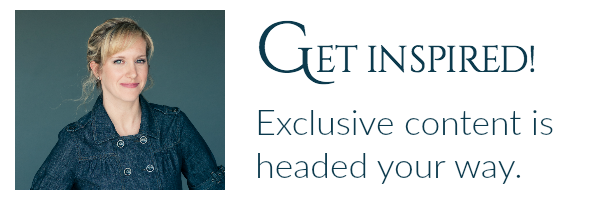by Kelli Stuart | Faith, Inspiration
I sat in the middle of a long table, a spread of foreign food laid out before me. It was hot in there, bodies compacted together, unfamiliar syllables and consonants mingling with the smells to overwhelm my senses entirely. I took it all in quietly, not really sure of my place inside this boisterous bunch. After a few minutes of simple observation, the meal was served, and I finally asked the question burning in my heart.
“How did you do it? How did you survive?”
It was 1995, and I was Kiev, Ukraine, in the home of Maria Ivanovna. I knew her story, having been told by her granddaughter who served as the translator for our group. I knew that she’d been sent to Germany at the age of 14 to serve in a slave labor camp. I knew she’d survived starvation and brutality, and at least one severe beating.
I knew that when the war finally ended, she found her way back to Ukraine by jumping on trains, sometimes clinging to the outside of a train car for hours.
I knew that her father was one of the few who survived Babi Yar, the killing ditch where nearly 34,000 men, women, and children were massacred in two days time in 1941.
I knew all the details, but what I couldn’t wrap my mind around was how.
How did this little woman with the silver hair and hearty laugh survive those years with her spirit in tact? How could she sit before me and tell her story without slipping into the horror of those years again?
How was she so…happy?
I wish I could remember her answer. I asked this question as a sixteen year old girl, long before the thought of writing a book ever took shape. I was just curious, and I remember the room growing quiet as my question was translated into a language I did not yet understand.
While I do not remember her exact words, I do remember the way she looked at me. Her eyes were a smile, peace shimmering in the depths as she focused tenderly on my face.
Though I don’t remember the exact words spoken at that dinner so many years ago, what I do remember is how I felt when we left that night. Maria made me feel brave.
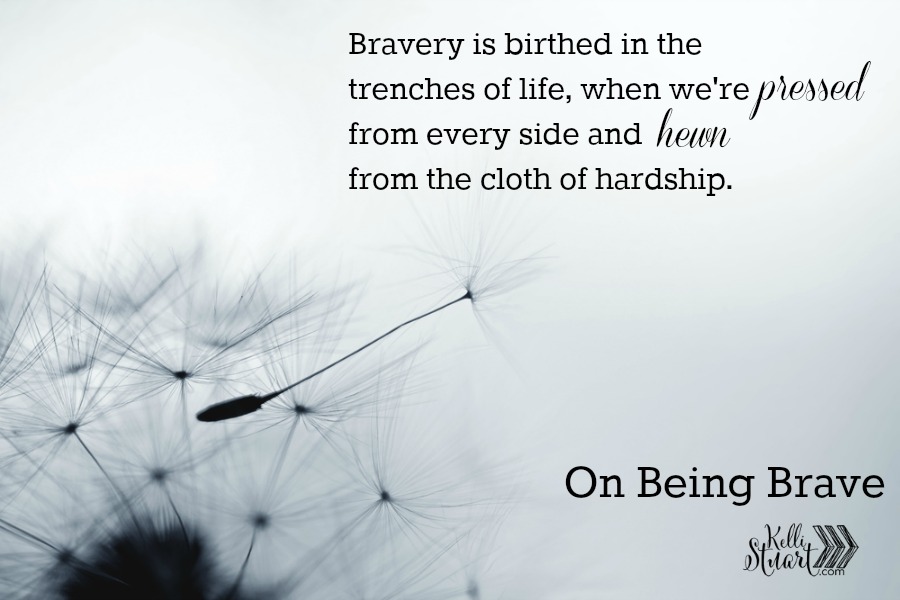
I’d never really thought of myself as brave before that night.
Adventurous, maybe. Impulsive, gregarious, excitable. But brave? Not really.
Like any sixteen year old girl, I battled insecurities on a daily basis. I found myself constantly fighting against the impulse to tuck into the corners of my life and reside in the shadows, because wouldn’t it be easier there? If I could minimize expectation, perhaps I could also minimize the threat of failure, of heartache, of any sort of emotional pain.
But there was something about Maria that made me feel like I could step out of the shadows.
It was the way that she carried her story, the way she so willingly gave her experience to me, like it was a treasured gift. There was no animosity, no bitterness, in her memories. She didn’t wear them like an albatross, walking victimized through the rest of her life.
Years later, I returned to Ukraine and I spent the afternoon with Maria’s granddaughter, Helen. Maria was sick and couldn’t take visitors at that time, but she took my questions over the phone through Helen’s translation. Even then, though grown and preparing to be a mother myself, I still wrestled with the cruelty and brutality of those dark war years.
I still didn’t understand how she did it – how any of the men and women who survived World War II did it.
But I’ve learned in the years since then that bravery isn’t something you’re born with – it’s something you learn.
[Tweet “Bravery isn’t something you’re born with – it’s something you learn.”]
Bravery is birthed in the trenches of life, when we’re pressed from every side and hewn from the cloth of hardship. But where does it come from?
“Have I not commanded you? Be strong and courageous. Do not be afraid; do not be discouraged, for the Lord your God will be with you wherever you go.” Joshua 1:9
If we truly understand the origins of bravery, then we just might see the potential waiting for us in the hard times. Bravery isn’t something that I can muster up on my own strength, though I suppose I could convince myself of that.
No, bravery and courage are most alive inside the power of the One who wove them into me in the first place.
The potential for bravery is knit into all of us, whether we see it or not. But the recognition of God as the author of that bravery unleashes a power far greater than any of us realize.
This is one of the many lessons I learned as a young woman in a foreign land. Bravery isn’t defined by rank or uniform, or even by experience. Bravery is simply lived and shared, and acknowledged in the hard places of life.
Be brave today, friends.
by Kelli Stuart | Creativity, Dreaming, publishing, Writing
There’s a certain flaw in my personality. I know this comes as a shock to you, but it’s true. I am not perfect.
This certain flaw of mine resides firmly inside my stubbornness. I hate being told I have to do something.
Maybe you can relate?
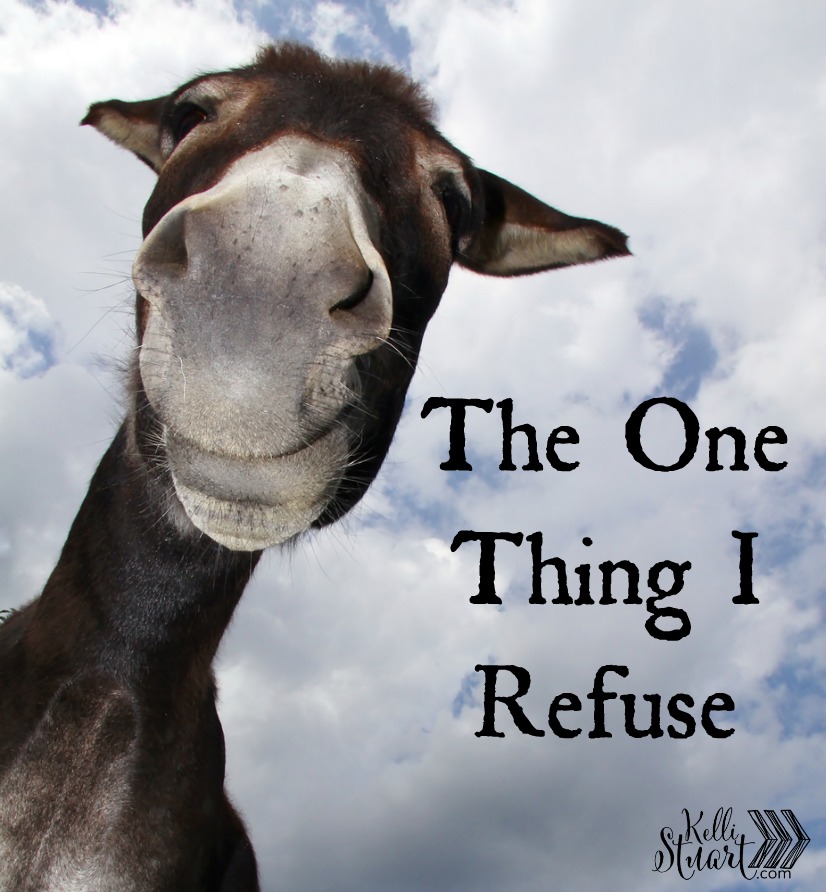
Image Credit: Claudia Otte/Shutterstock.com
My first reaction to someone telling me I have to do something is to dig my heels in and say, “Nope. Not gonna happen. Thanks for asking, though.”
Now that I’m a grown up girl, of course, I’ve gotten better at controlling this impulse. I’m better at listening and receiving advice, and much more willing to concede the wisdom of others than perhaps I once was.
But I still don’t like being told I have to do something.
Writing books is a funny business. You think the book writing part is the hard part, and to a degree it is. As a writer once famously said, “There is nothing to writing. All you do is sit down at the typewriter and bleed.” (This quote is most often attributed to Earnest Hemingway, but as it turns out, he wasn’t the one who said this. Thanks, internet, for ruining my morning.)
Once you get past the draining nature of bleeding onto paper (screen…whatever), you then get to enjoy the process of finding someone to validate your work. I thought that was the hard part, until I finally got set up with the agent and the publisher, and got back the first, second, and third round of edits.
Surely that was the hard part, right?
It turns out I was wrong about all of it. The hardest part of writing is the marketing and the launching and getting the word out there about all that bleeding you did on paper (screen…whatever).
THIS IS THE HARD PART!
When I’m not nursing sick babies (hello strep throat! You’re no longer welcome), homeschooling, shuttling from baseball to soccer to flag football to youth group to gymnastics, and trying to fit in conversations with my husband, I’m working on the launch plan for the books I’m releasing this year.
I’m not complaining about this – not in the slightest. It’s terribly exciting, and the process is invigorating, of only slightly overwhelming. But there’s one problem:
This process of launching books can take over your life.
Every spare moment I have – every quiet, free second when the kids are playing, or the baby is sleeping – I am working on my plan to launch these books. And the more that I feel pressured to do to make this a “successful” launch, the more I want to dig in my heels, shake my head, and say, “Nope. Not gonna happen. Thanks for asking, though.”
Here’s the thing: I see the wisdom in all these things. If I were to do everything that was recommended to successfully launch and market my books, I can quite easily see how it would work.
But I can also see how it can control a person.
It will be summertime when I launch my novel – the time of year when all my children are home all day every day. Those are short months we’re given each year in which we get to make memories – to enjoy one another as a family without all the pressures of life.
I refuse to be controlled by book launches. I refuse to sacrifice my summer, and my children’s summer, with marketing. So, what does that mean?
It means I have to be strategic. It means I’m listening to the advice of my launch manager who is helping me control my strategy so that it doesn’t control me.
I’m working ahead of schedule as much as possible so that when summertime rolls around I’ve got a bulk of the work pre-done.
I’m listening to the words of wisdom, and I’m sifting through it, tailoring it to fit my life – the life of a mother with four young children who don’t necessarily need me to be a bestselling author.
They need me to be their mom.
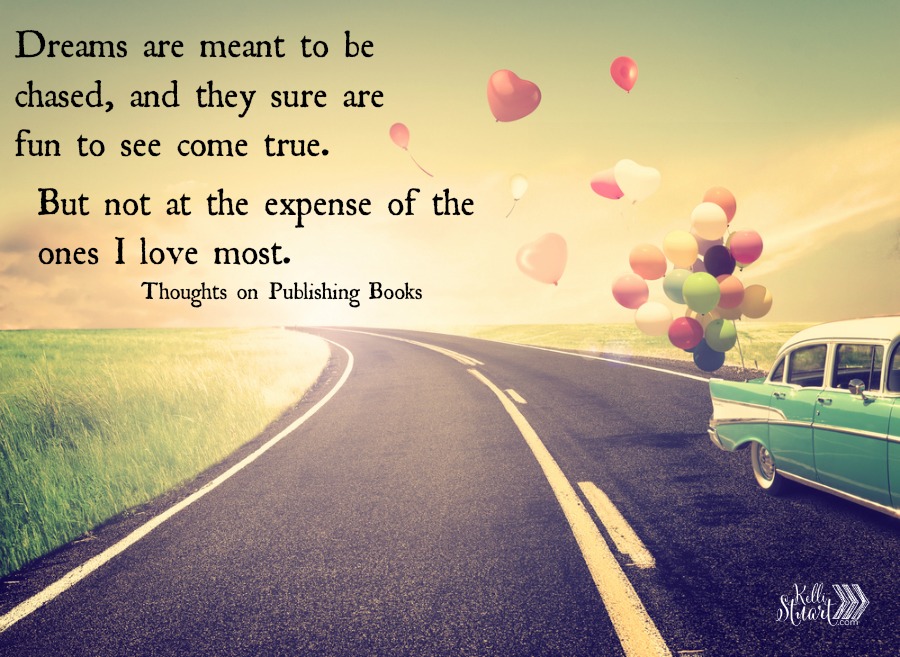
Image Credit: jakkapan/Shutterstock.com
Do I want to see these books thrive?
Absolutely.
Would I love to hit a bestseller list?
Of course!
Am I will to put in the work to make that happen?
Yes…but not at the sacrifice of the people closest to me.
So I’m navigating these waters cautiously. I may not be doing as much as I should be. I’m dropping balls left and right (some of them here at home, and some of them in marketing).
But I refuse to be consumed completely.
[Tweet “Dreams are meant to be chased, but not at the expense of the ones I love most.”]
Turns out that stubbornness of mine comes in handy now and again.
by Kelli Stuart | Family, Motherhood
Motherhood sometimes feels like it’s trying to suffocate me – like it’s holding a pillow over my head and telling me softly, “Sshhh…this won’t take long. Stop resisting.”
The kids pull me into their rooms and whisper secrets, dreams, fears, longings for a change in trajectory, and I find myself feeling completely inept in my ability to guide them. So I listen and I nod, and I ask all the good questions. Then I leave their rooms with these sacred secrets tumbling around inside me all jumbled and swirly, and I wonder what it all means.
Before I can even begin to process it all, I find myself running after the toddler who’s got nail polish in her hand again, or she’s dumping out cereal boxes on the floor, or she’s pulling all the books off the bookshelf, or…
There’s so little time to process all the needs of the people living under this roof of mine.
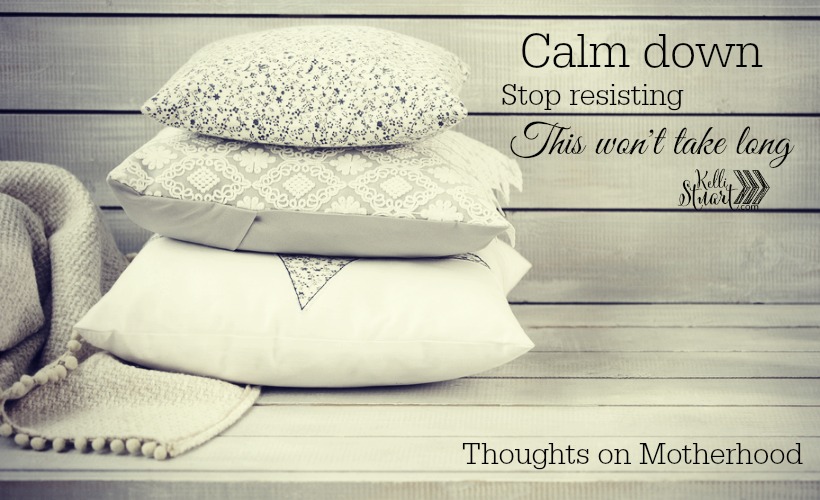
I crawl into bed many nights a weary, tangled mass of nerves, and I set my alarm for early. I plan to pray into the dark before they rise, preparing myself for the onslaught of new issues and needs. But that alarm cuts through the darkness with an angry growl, and before I know it I’ve turned it off and drifted back to sleep.
So our days go, on and on. Always feeling just a little bit behind. Just a little bit incapable. Just a little bit unsure.
And I can’t really breathe.
But then…
The littlest wakes up cooing and jabbering in her bed. I walk into her room and sing “Good morning” as I pull open the shade, and her face splits wide into a grin. When I pick her up, she nestles her face into the crook of my shoulder, her hot breath tickling my neck. Her chubby arms squeeze me tight, and it feels like a deep breath.
After breakfast, the biggest leans over and gives me a kiss on the cheek. “Good morning,” I murmur.
“Your mom has a good morning.”
I laugh because he’s into ‘Your mom‘ jokes. The laughter is another deep breath.
When the second and third borns wake up and stumble sleepily into the kitchen, Annika lets out a squeal of delight and tackles them with a hug around the knees. The sisters tangle themselves up together in a hug, and I get all weepy at the sight.
And there’s another deep breath.
A few of those moments a day begin to add up, and all of the sudden I can breath again. Or at least I’ve enough life-sustaining breaths to get me through those times that feel weighty and too much.
[Tweet “Motherhood is a series of question marks broken by the occasional burst of exclamation points.”]
Today is another new day, bringing with it a slew of new challenges. My feet hit the tile this morning, and the crazy won’t stop until I crawl back into bed tonight.
So far we’ve had stubbed toes, spilled milk, a few tantrums, and math lessons that make no sense. But when I picked the fourth grader up from her music class, she jumped into the (smokin’ hot) minivan with eyes lit triumphant and held up her recorder proudly.
“I passed!” she beamed, and her smile broke through the mounting pressure of the day.
*inhale*
So I’ll take these deep breaths where I can get them, and in the moments when I feel like it’s all pressing down on me I’ll force myself to calm down, stop resisting, and remember this won’t take long.
by Kelli Stuart | Family, Motherhood, Raising Children
When I first became I mother, I knew everything there was to know about mothering. As I lay nestled in my hospital bed with Sloan all bundled tight and hot against my chest, I felt a confident calm. Because I had read all the books, so I knew how this was all going to shake down.
I was going to nail motherhood.
Twelve and a half years later, I’m four kids in, and I’ve come to the conclusion that I don’t have a clue what I’m doing. On any given day, I’m pretty sure I’m winging it.
None of my babies, not even the littlest, like to be wrapped tight and lay against my chest for any period of time anymore. They’re busy, and they take their snuggles on the go.
And also, I now understand just how little I know about this act of mothering.
Oddly enough, I haven’t figured it all out. I started out so confidently, and then that swaddled bundle of mine grew into a little boy – a strong-willed little boy with opinions. And then two more joined the fray, and they had opinions.
And then the fourth one came along, and I’ve decided not to allow her to formulate opinions. I’m sure that’s going to work out well for me.
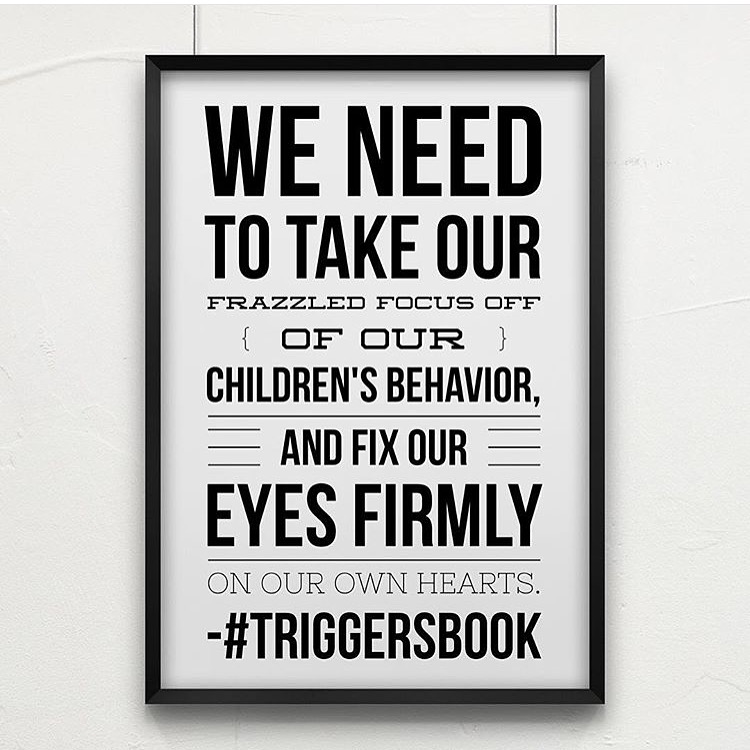
So now I live in a house full of small people, all of them clamoring to make their opinions known, each one pushing back in their own unique way and, quite frankly, there are some days when I think I might lose my mind.
And there are other days when I’m pretty sure it’s already been gone for some time.
So what’s a mom to do when she’s lost her mind, and the children are crying, and the house is a mess, and her husband is out of town, and the insanity of it all just. won’t. stop?
She can start by taking a few deep breaths. In the middle of typing that last sentence, one of my children spilled an entire bowl of cereal. The milk dumped out onto the baby who was standing underneath the table, and I wanted to cry because all I want is to finish a sentence.
That’s it.
Just a sentence.
But you know that thing about crying over spilled milk? Yeah, there’s something to that. Because it was just an accident. He didn’t spill his cereal as an attack on me. He wasn’t trying to interrupt my train of thought.
He was just trying to give his sister a bite of his cereal and his elbow got in the way.
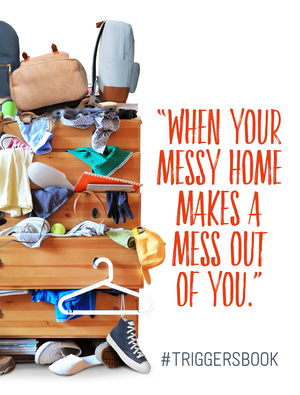 So *deep breath* we cleaned it all up and moved on. Because I know now that damaging their little hearts over an accidental spill isn’t worth it. Growing angry over my children’s childish behavior isn’t productive for them or for me.
So *deep breath* we cleaned it all up and moved on. Because I know now that damaging their little hearts over an accidental spill isn’t worth it. Growing angry over my children’s childish behavior isn’t productive for them or for me.
As I raise these children of mine, I’m growing up, too. Some days I do great. I take deep breaths, and I smile as I mop up spilled milk.
Other days, I have to leave the room for a few minutes to pull it together.
And sometimes I have to apologize.
[Tweet “Motherhood is as much an act of my own personal growth as it is my children’s growth.”]
My friends, Wendy and Amber, have written a wonderful resource for moms to help us as we grow into motherhood. It’s a process, this business of being mom. It’s not innate – not really. Every day is different, every child is different, every life stage is unique, and we have to keep up.
I’m thankful for resources that come along and support my growth as a mom. Using sound biblical guidance, Wendy and Amber have given us tools for dealing with each TRIGGER that might threaten to undo us. We don’t have to do this motherhood gig alone.
If you feel like you’re drowning and you can’t get a handle on the emotions that accompany parenting, I highly recommend this book.
Now, if you’ll excuse me, I’m off to mop up a sticky floor. And also, the toddler has gotten really quiet. That’s never, ever a good thing.

Purchase your copy of TRIGGERS: Exchanging Parents Angry Reactions for Gentle Biblical Responses here.
by Kelli Stuart | All About You, Creativity, Dreaming
Our little house sat nestled on a five-acre field, the sprawling Wisconsin woods providing the backdrop to what was a pretty idyllic scene. I was a child, so my memories of Wisconsin winters are filled with nothing more than magic. Hours spent tunneling through the snow, building igloos, eating snacks inside our burrowed out snow caverns in six and seven foot drifts.
We lived at the top of a large hill, so the neighborhood descended upon our back yard daily to sled. We’d bring out pitchers of water at the end of each day, and build up a ramp of snow, sprinkling it with water between each layer. By morning, we’d have a frozen solid launching pad for our toboggans.
My bedroom was on the second story, and I’d wake up each morning to look out over the stark white landscape, a wonderland of possibility for my imaginative mind. I didn’t need a wardrobe to reach Narnia. It waited for me in my backyard.
It’s easy to remember those Wisconsin years with great fondness. I was a child, and my only responsibility was to bundle up and give in to the imagination. As an adult, I shudder at the thoughts of frigid winters and snowy fields, but as a child?
I lived for winter.
When I was little, there were few things I enjoyed more than exploring. My brother and I would wake early and make plans to traverse the woods behind our house. Of course, during hunting season it was imperative that we wore bright colors and made enough noise to not be mistaken for deer, but in the summer, when the snow finally melted and the trees turned vibrant, we’d spend hours and hours in their shade.
There’s magic in exploration, and I miss it.
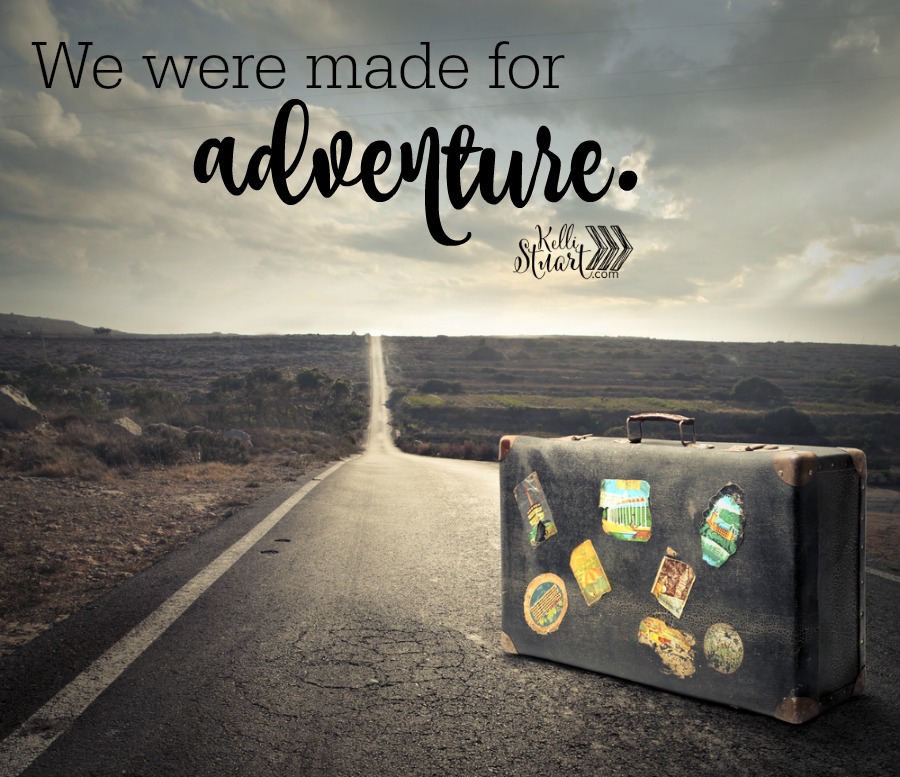
There are days when the mundane feels like a blanket over my head. The predictability of life presses down, and I find myself longing for those early years when I was nothing more than the girl in the trees, swinging from one grand adventure to the next.
There are other days, however, when I’m completely smitten with this life I’m living. As the cooler Florida weather kisses my bare arms (I’ll take a Florida winter over a Wisconsin winter any day of the week now), I watch my husband and kids play in the backyard.
The boys kick the soccer ball, whooping and hollering in delight with each scored goal.
Tia flips and tumbles over her mats, the very same mats upon which I used to flip and tumble in my Wisconsin yard as a child, and I feel her delight as she takes in the world upside down.
And Annika tromps through the yard, high stepping over the areas where the grass is a little too high. Her face is filled with that rapturous delight that only toddlers possess when they’re given the freedom to roam unhindered.
All the sights and sound assail my senses, and I realize there’s plenty of adventure left. Some of the adventure is awesome, the imaginations of my small people lighting the path for grand adventures.
Some of the adventure I could do without – like broken bottles of nail polish and shattered snow globes, and everything else the rambunctious toddler longs to attack inside the house.
It’s all an adventure, even the monotony. I guess it’s just a matter of perspective, and a willingness to use your imagination. Because the truth is, we were made for adventure. We weren’t made for monotony because it leads to complacency, and there’s no power in complacency.
[Tweet “You and me – we were made for adventure.”]
If you sit back and think about it, I imagine you’re seeking adventure just like I am. Maybe you’re an obvious thrill seeker, always open and game for the next wild endeavor.
Or maybe you’re a homebody, content to stay nestled inside your comfort zone.
But I imagine you still long for adventure.
So what does adventure look like for you? Is it the challenge of your work? Is it the delight you take in watching your children grow? Is it travel? Do you find adventure in a good book, or in the creativity of your every day life?
What is it that breaks you free from the monotony of the day to day? When was your last adventure?
Has it been too long?
Helen Keller told us that “Life is either a daring adventure, or nothing at all.” If this is true, and if you believe it, then what are you doing to enjoy the ride?
Happy Tuesday, friends. Make today an adventure.





 So *deep breath* we cleaned it all up and moved on. Because I know now that damaging their little hearts over an accidental spill isn’t worth it. Growing angry over my children’s childish behavior isn’t productive for them or for me.
So *deep breath* we cleaned it all up and moved on. Because I know now that damaging their little hearts over an accidental spill isn’t worth it. Growing angry over my children’s childish behavior isn’t productive for them or for me.

